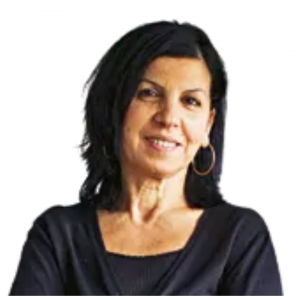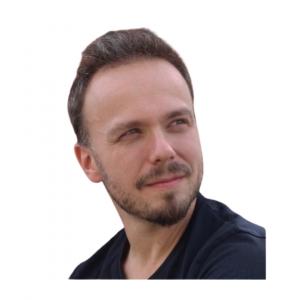Our team
Bringing together clinical and scientific expertise in the field of neurodevelopmental disorders, iMIND is co-run by Caroline Demily, psychiatrist and head of the university-hospital service ‘ADIS’ (autism and intellectual disabilities) at the Hospital Vinatier, and Angela Sirigu, Director of research at the CNRS (national scientific research centre).
Based in Lyon, between the Marc Jeannerod Institute of Cognitive Sciences and the Hospital Vinatier, they are accompanied by Jennifer Beneyton, Raphaele von Koettlitz, Hajer Atti, Amélie Soumier and Guillaume Lio, who are united by their common desire to make society more inclusive for neurodiverse people
Caroline Demily
Angela Sirigu
iMIND coordinator
Scientific director

Professor Caroline Demily is the head of the university-hospital service ‘ADIS’ (autism and intellectual disabilities) at the Hospital Vinatier, a service specialising in diagnostics and care for patients presenting neurodevelopemental dirsorders and severe behavioral issues. The service ‘ADIS’ is constituted of various care offerings dedicated to supporting adults or teenagers transitioning into adulthood. Caroline also created and runs GenoPsy, the reference centre for rare genetic psychiatric diseases. She also coordinates an inter-university post-grad diploma programme on the topic of autistic adults at the university Claude Bernard Lyon 1.

Director of research for the CNRS (national scientific research centre) at the Institut of Cognitive Sciences Marc Jeannerod, which she ran from 2016 to 2020 and was pivotal to its’ development, Angela Sirigu is world respected for her contribution to the study of the role of of the parietal cortex in the representation of movement and the prediction of its sensory consequences. She has also studied cortical plasticity: she has shown that neurones in the motor cortex of amputee patients conserve their capacity to generate a neural command, giving critical pistes for pain management for those with fantom limbs. Finally, she studies the cognitive, social and emotional factors that contribute to decision making. She has shown, for example, that the hormone oxytocine increases the capacity of autistic people to respond positively to social signs.
Jennifer Beneyton
Raphaele von Koettlitz
Project manager
Communications officer
 After a masters in International Business at IAE, University Lyon 3, with two years spent abroad, Jennifer worked at the institute of Stem Cell and Brain Research in Lyon as the European project manager. After about 10 fascinating years working side-by-side with neuroscientists at the LabEx CORTEX, working in an administrative capacity (including project management, communications and event planning), Jennifer was keen to broaden her horizons and work more closely with end-users and be more embedded in the clinical side of neuroscience. The creation of the iMIND centre was therefore the perfect opportunity for her!
After a masters in International Business at IAE, University Lyon 3, with two years spent abroad, Jennifer worked at the institute of Stem Cell and Brain Research in Lyon as the European project manager. After about 10 fascinating years working side-by-side with neuroscientists at the LabEx CORTEX, working in an administrative capacity (including project management, communications and event planning), Jennifer was keen to broaden her horizons and work more closely with end-users and be more embedded in the clinical side of neuroscience. The creation of the iMIND centre was therefore the perfect opportunity for her!
 Raphaele has been working in the field of communications and the disability sector for the past ten years, mostly in the United Kingdom. Her work has always been centred around changing the narrative around disability and neurodivesity, to reduce stigmatisation and share best practice to create a society more inclusive for disabled people. She designed a training programme for disabled people experiencing homelessness which won the Global Equality and Diversity Noon Award en 2019. She studied social anthropology and latterly social sciences with a focus on healthcare.
Raphaele has been working in the field of communications and the disability sector for the past ten years, mostly in the United Kingdom. Her work has always been centred around changing the narrative around disability and neurodivesity, to reduce stigmatisation and share best practice to create a society more inclusive for disabled people. She designed a training programme for disabled people experiencing homelessness which won the Global Equality and Diversity Noon Award en 2019. She studied social anthropology and latterly social sciences with a focus on healthcare.
Hajer Atti
Amélie Soumier
Neuroarchitect
Chercheure
 Hajer started delving into the subject of autism and et neuroarchitecture in 2009, as part of her final project when studying to be an architect. After having obtained her degree and masters in architecture in 2013 et having worked in different studios in Paris, she specialised in heritage. Afterwards, she passed her post graduate research diploma with a distinction, with her thesis on the topic of « The role of neuroarchitecture in mitigating the symptoms of neurodevelopmental dirorders: the case of autism ». Following this, she started a PHD in neuroscience, under the supervision of Caroline Demily and Angela Sirigu.
Hajer started delving into the subject of autism and et neuroarchitecture in 2009, as part of her final project when studying to be an architect. After having obtained her degree and masters in architecture in 2013 et having worked in different studios in Paris, she specialised in heritage. Afterwards, she passed her post graduate research diploma with a distinction, with her thesis on the topic of « The role of neuroarchitecture in mitigating the symptoms of neurodevelopmental dirorders: the case of autism ». Following this, she started a PHD in neuroscience, under the supervision of Caroline Demily and Angela Sirigu.
 A researcher in cellular and molecular neurobiology, Amélie worked for nearly 10 years in the United States (NIMH, UPMC) on the characterisation of dysfunctional neural networks linked to neuropsychiatric disorders such as depression and anxiety. Now at iMIND, Amélie is targeting the oxytocin networks strongly suspected to be involved in the onset of autism spectrum disorders using an innovative 3-dimensional cell imaging approach that allows to map brain development with unprecedented accuracy.
A researcher in cellular and molecular neurobiology, Amélie worked for nearly 10 years in the United States (NIMH, UPMC) on the characterisation of dysfunctional neural networks linked to neuropsychiatric disorders such as depression and anxiety. Now at iMIND, Amélie is targeting the oxytocin networks strongly suspected to be involved in the onset of autism spectrum disorders using an innovative 3-dimensional cell imaging approach that allows to map brain development with unprecedented accuracy.
Guillaume Lio
Researcher

He is an engineer specialised in signal processing, image processing and data analysis and holds a PhD in neuroscience from the University of Lyon I. He is now a research fellow. Guillaume’s research projects focus on the development of analysis methods for different clinical pathologies in order to create clinical screening tools, to improve patient management strategies or to improve the knowledge of neuro-psychophysiological models of different pathologies.
